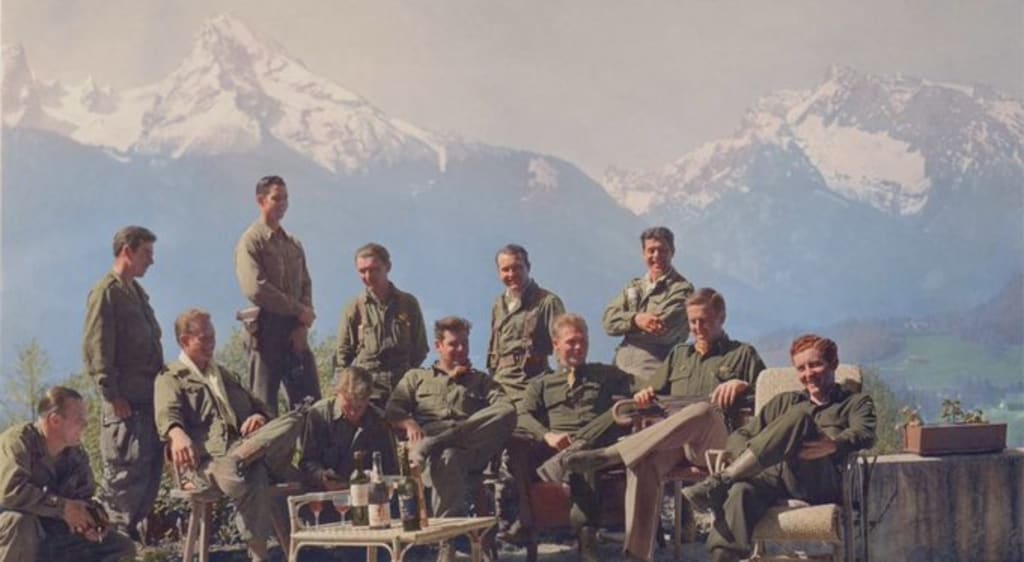Easy Company's Triumph at Hitler's "Eagle's Nest" in 1945
A Comprehensive Exploration of the 101st Airborne's Heroic Feat

The year was 1945, and the world was in the throes of World War II. Amidst the chaos and conflict, one unit of the U.S. Army stood out for its exceptional bravery and resilience—Easy Company of the 101st Airborne. The pinnacle of their journey led them to the symbolic heart of Nazi Germany, Hitler's mountain retreat known as the "Eagle's Nest." In this detailed article, we delve into the extraordinary exploits of Easy Company as they scaled the heights of the Bavarian Alps to seize Hitler's fortress, examining the context, challenges, and ultimate triumph that defined this crucial chapter in the closing days of the war.
Before we journey to the Eagle's Nest, it's imperative to understand the context in which Easy Company operated. The 101st Airborne Division, renowned as the "Screaming Eagles," played a pivotal role in the Allied efforts during World War II. Comprising highly trained paratroopers, this elite division became synonymous with daring airborne operations and swift maneuvers behind enemy lines. Easy Company, a unit within the 101st Airborne, had already distinguished itself in the crucible of combat, facing the challenges of Normandy, Operation Market Garden, and the Battle of the Bulge.
Easy Company's journey to the Eagle's Nest was marked by a series of grueling campaigns. Their odyssey began with the harrowing D-Day landings in Normandy, where they faced the chaos of the beachhead, followed by the intense combat during Operation Market Garden in the Netherlands. The crucible of the Battle of the Bulge tested their mettle as they held the line against the German onslaught in the Ardennes Forest. Each engagement forged Easy Company into a battle-hardened unit, ready to face the challenges that awaited them in the Bavarian Alps.
Perched atop the Kehlstein Mountain in the Bavarian Alps, the Eagle's Nest was Hitler's mountain retreat—a symbol of his power and opulence. Constructed as a gift for the dictator's 50th birthday, the building boasted architectural grandeur and panoramic views of the surrounding landscape. Its strategic location made it a formidable stronghold, and capturing it became a symbolic objective for the Allies as they sought to dismantle the Nazi regime.
In the waning days of the war in Europe, Allied forces closed in on Germany. Easy Company found itself at the forefront of the push into Bavaria. The operation to capture the Eagle's Nest, codenamed Operation Maple Leaf, called upon the 101st Airborne Division to execute a daring mountain assault. The mission was twofold: neutralize any remaining German resistance and secure the Eagle's Nest to prevent it from becoming a last stand for die-hard Nazi loyalists.
The ascent to the Eagle's Nest was a formidable undertaking. The rugged terrain of the Bavarian Alps presented numerous challenges, from treacherous mountain paths to unpredictable weather conditions. Easy Company, known for their tenacity and esprit de corps, scaled the heights with determination, facing not only the physical challenges of the climb but also the psychological weight of knowing they were closing in on one of Hitler's sanctuaries.
As Easy Company made their way up the Alpine slopes, they encountered pockets of determined German resistance. The remaining forces, fiercely loyal to Hitler, were determined to defend the Eagle's Nest at all costs. This led to intense skirmishes as Easy Company engaged in close-quarter combat with the enemy, navigating the rocky terrain and dense vegetation in a bid to reach their objective. The battles along the way showcased the valor and combat proficiency that had become synonymous with the 101st Airborne.
After overcoming the challenges of the ascent and engaging in fierce battles with German defenders, Easy Company reached the summit of the Kehlstein Mountain. The Eagle's Nest, once a symbol of Nazi prestige, now stood as a conquered fortress. The success of Easy Company in capturing this iconic location was a testament to their training, resilience, and unwavering dedication to the Allied cause. The victory at the summit marked a pivotal moment not only for the 101st Airborne but for the broader Allied forces as they approached the final days of the European theater of war.
The capture of Hitler's Eagle's Nest by Easy Company resonated far beyond the closing days of World War II. The symbolic significance of seizing the dictator's mountain retreat served as a powerful statement of Allied triumph over Nazi tyranny. The images of American soldiers standing atop the Kehlstein Mountain, overlooking the Bavarian landscape, became iconic representations of victory and the indomitable spirit of the Allied forces.
The journey of Easy Company to Hitler's Eagle's Nest in 1945 stands as a testament to the courage, skill, and determination of the men of the 101st Airborne Division. From the beaches of Normandy to the heights of the Bavarian Alps, Easy Company faced the crucible of war and emerged victorious. Their triumph at the Eagle's Nest remains etched in history as a defining moment in the Allied campaign against Nazi Germany. The legacy of Easy Company endures as a symbol of the sacrifices made by those who fought for freedom, and their heroic feat at Hitler's mountain retreat remains a beacon of courage and resilience in the annals of military history.
About the Creator
Enjoyed the story? Support the Creator.
Subscribe for free to receive all their stories in your feed. You could also pledge your support or give them a one-off tip, letting them know you appreciate their work.






Comments
There are no comments for this story
Be the first to respond and start the conversation.